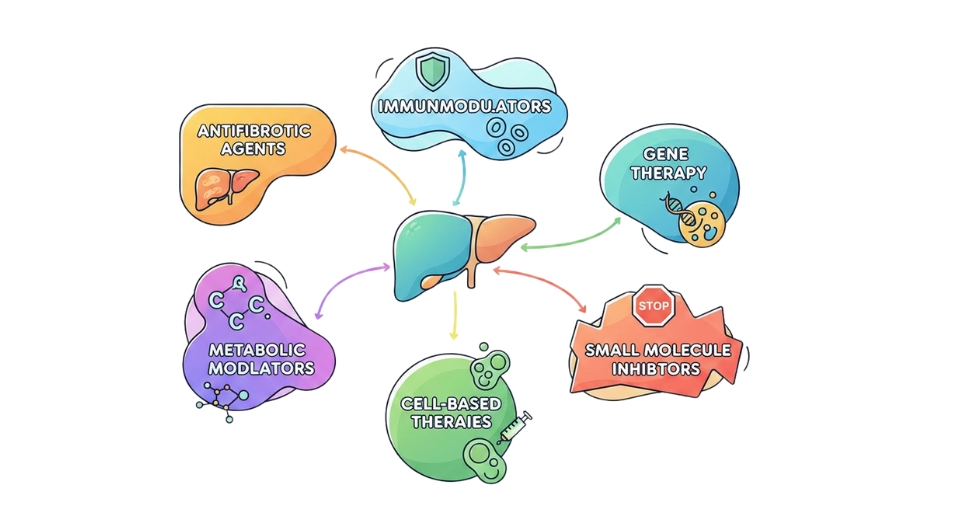
Nov 25, 2025

The newest forecast of the liver disease therapeutics market by Metastat Insight comes out just at the right time when healthcare systems look for treatments that can really change the future of patients with long-term liver problems. With clinical expectations going up and medical teams looking for options that help in earlier intervention, better monitoring, and more adaptive care models, the focus is on those solutions that go beyond just symptom management. Supporting the stability of the whole organ, enhancing the physiological processes beneath, and providing the modern-day therapeutic goals aligned with the clinician’s tools are some of the treatment methods that are getting more and more interest.
Market Context
Healthcare practitioners are still struggling with the issues of late diagnosis, unpredictable disease course, and very few options for personalized treatment. These obstacles affect the search for ways that can help heal, preserve function, and reduce the burden on the healthcare system. The medical landscape is now more willing to pay a higher price for treatments that can manage conditions related to metabolism, immunity, and lifestyle changes. The liver disease therapeutics market is, therefore, the one that provides opportunities for better doctor-patient relationships while presenting treatment concepts that are tailored to intricate clinical situations.
How It Works / Why It’s Valuable
Innovative therapies in the liver area are becoming the mainstay of treatment in the form of drugs that stimulate the liver to heal itself, control metabolic processes, and eliminate complications induced by the taking liver. The majority of these options concern metabolic balance enhancement, immune response boosting, and anti-inflammatory loads lowering. The value of these approaches lies in the fact that they provide the physicians with chances to use tools such as diagnostics, digital health platforms, and innovative care protocols. Their use is being extended to hospital settings, specialty practices, and coordinated care programs through the collaboration of medical personnel who are more sure of their responses to complex clinical needs. One of the main benefits from the treatments is their compatibility with the monitoring devices, making the adjustment process easier and the care continuity better.
Growth Story / Technological Evolution
The market developments mirror the fusion of scientific advancement, data-driven healthcare strategies, and the often unnoticed gradual rise of clinical adoption. The first case studies showcased a very narrow range of usage. Nevertheless, the therapeutic design kept improving steadily and thus the confidence was rooted even deeper, leading to the application across several care settings. The industry has matured through many phases of innovation in formulation science, drug delivery mechanisms, molecular targeting, and companion diagnostics. Each cycle of innovation has enhanced the industry’s claim that it is serving the broader healthcare aims, especially now that precision-oriented approaches are easier to access. Ongoing refinements talk not only about the strong momentum and sustained interest that gradual but continuous progress can generate but also about the powerful nature of gradual but continuous progress.
Regional or Global Trends
Some regions have embraced advanced therapeutic methods earlier than others, often due to strong research networks, specialist training programs, and healthcare policies that encourage adoption of contemporary treatment frameworks. Areas with robust clinical trial activity and established biotechnology clusters see steady integration as new therapies enter the market. In contrast, emerging regions showing rapid improvement in healthcare access demonstrate significant growth potential, driven by expanding hospital infrastructure and rising awareness of chronic hepatic conditions. These locations show interest not only in therapeutic innovation but in supportive technologies that allow efficient deployment and monitoring of treatment pathways.
Challenges and Opportunities
The market continues to navigate obstacles involving treatment affordability, access to specialized care, and the variation in monitoring capabilities across different healthcare systems. Regulatory environments shift as scientific understanding expands, encouraging companies and research teams to refine approaches to safety and long-term performance evaluation. Alongside these constraints, meaningful opportunities emerge. New modalities rooted in molecular science, regenerative concepts, and digital integration offer avenues for differentiation. Expanding collaboration between pharmaceutical innovators, clinical research centers, and health-technology developers widens the potential for partnerships that can introduce more effective tools into diverse care settings. As new therapeutic classes mature, compatibility with telemedicine platforms, advanced diagnostics, and personalized care strategies creates fertile ground for the introduction of more adaptive treatment models.
Why It Matters Now
Growing focus on sustainable healthcare delivery, preventive approaches, and long-term wellness strategies heightens the importance of therapeutic advancement in this category. Many global initiatives emphasize early management of chronic conditions, supported by improved diagnostic accuracy and better coordination across healthcare teams. In this context, the liver disease therapeutics market presented by Metastat Insight takes on elevated relevance, offering insight into solutions that align with broader health priorities. Rising interest in treatments that support organ resilience, reduce burdens on hospitals, and harmonize with digital transformation efforts underscores how this market contributes to healthier populations and more efficient care structures. As health systems worldwide seek strategies that balance innovation, access, and long-term stability, the global Liver Disease Therapeutics Market stands positioned to influence future standards of care while shaping a more responsive therapeutic landscape.
Drop us an email at:
Call us on:
+1 214 613 5758
+91 73850 57479